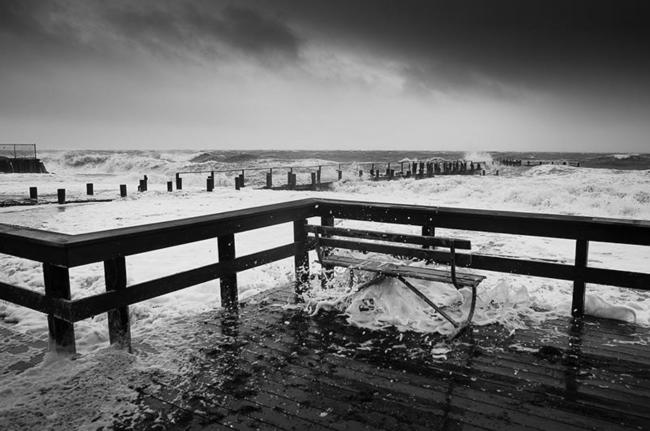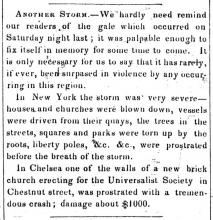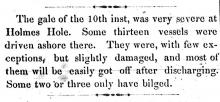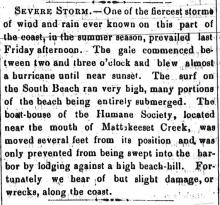The inclement, sultry weather of Sunday and Monday terminated Monday night in one of the severest gales ever known in this vicinity at this season of the year, accompanied by the highest tide in the memory of our residents, for many years. The gale, which was rotary, blew heavily from the southeast during the first part of the night, then moderated to nearly a calm, next springing up from the northwest with terrific violence, after which it veered to the west and toned down to a strong breeze. A large sloop boat belonging to George Huxford, and moored under the Chappaquiddick bluff, inner harbor, broke away, drifted across to the West side and was left high and dry upon the beach near the residence of the late Joseph Dunham, but apparently sustained but little injury. A sailboat belonging to Wm. H. Norton got adrift and ran upon a rocky bulkhead near his residence, damaging the boat from $50 to $100. Osborn’s wharf, foot of Math St., was flooded and considerably washed, cord-wood floated about, etc., and but for the extra exertions of Mr. Osborn and assistants, (among whom was our nimble devil), who were upon the dock for the first half of the night, the bark Robert Morrison would have floated off, the wharf piles to which she was fastened being pulled up. I. W. Selover’s pier was nearly demolished, and a large cap-log back of Ralph Cleaveland’s store was turned round In a space in which it would seem impossible, and placed upon the remnants of a walk to the rear entrance of a boathouse. At steamboat dock the sand filling and concrete above the planking was damaged, and the three masted schooner Hattie V. Kelsie, of New Haven, Capt. Randall, from Georgetown with about 750 tons of government coal for this place, which inopportunely attempted to haul in from Ripley & Fisher’s wharf in the night, and just as the storm was increasing in violence, ran aground between the wharves, and finally when succeeding in getting alongside, carried away the plank walk for discharging coal and otherwise damaged the wharf, and slightly injured the vessel. The captain walked overboard in the darkness, but was rescued.
Capt. Rufus Pease, over seventy years old, feeling alarmed for the safety of his boat, came down to the shore about 11 o’clock at night and finding it too rough to use a skiff, took off his clothes and plunged in, swam to his boat moored in the harbor, made her doubly fast, and then taking to the water again like a duck returned to the shore, thus successfully accomplishing what but very few would have undertaken, especially in the darkness of midnight.
The Martha’s Vineyard Railroad suffered considerable damage, the bridge over Sengekontacket opening being undermined, the bank washed down in several places, a heavy cut made at the outlet of Farm Pond, and a short piece of the bulkhead started near the Pavilion.
The “Beach Road” was injured to some extent, a portion of the filling across Farm Pond washing out and several piles were started in the bridge rendering it unsafe for travel. Repairs were immediately made and the road was passable Tuesday night.
At Oak Bluffs, the “Cottage City Opera House” tent was blown down, and will probably not be erected again, for the presentation of Uncle Tom’s Cabin as expected. Some of the smaller show tents suffered severely as did the “swing seats.” The tide was very high, at one time flooding the wharf. Large numbers of people visited the plank walk in the vicinity of the Sea View House from nine o’clock until midnight, to witness the heavy seas which rolled up the beach, leaped the railroad, sending the salt spray high into the air.











Comments